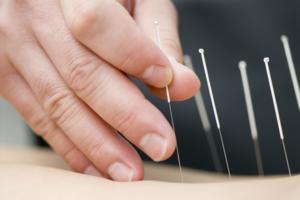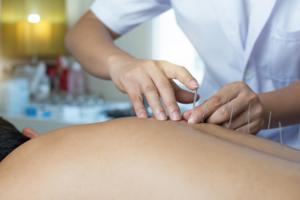![]() EXPERT
EXPERT
Jeff Rippey
Acupuncturist
- Saint Joseph, MO
- Colorado School of Traditional Chinese Medicine
- Accepting new patients
Why It's Hard To Tell Patients Where Needles Might Be Placed
I've been answering questions on this site for a couple of years now. There's been a recent trend towards acupressure questions which I addressed in my first blog post. Generally,...
Why It's Difficult to Answer Acupressure/Pressure Point Questions
As part of this site, patients have the capability of asking questions of practitioners and subject matter experts. Recently I’ve been seeing a lot of questions that take the...
What pressure point relieves shoulder pain?
What pressure point relieves back pain?
What pressure point relieves ankle pain?
Does the acupuncture pen really work?
How long does acupressure take to work?
For acupuncture patients, I usually tell them to give it at least 3 treatments before they decide it isn't working for them. I'd expect acupressure to be double that or better (6 or more treatments). In my experience, pressure techniques simply aren't as effective as needles.
Can you do too much acupressure?
Where a patient can sometimes run into problems is with local bruising. This can render the area too tender for repeated acupressure and is one of the reasons acupuncture (using needles) is often much better tolerated - it's way more comfortable particularly in repeated treatment.
Is acupuncture safe for diabetics?
It's the direct version that can sometimes cause problems for diabetics, particularly if they've developed diabetic neuropathy. In the US, we don't want to cause a burn or blister the skin through the application of moxa. Normally practitioners will ask for a lot of feedback from the patient so they can understand the person's heat tolerance and back off if things are warming up too much. This is a problem for someone with neuropathy or diabetic neuropathy as they may be insensitive to the heat.
Most licensed acupuncturists will avoid moxa, especially direct moxa, on neuropathy patients. However, Chinese medicine is one of those weird cases where patients aren't always seeing a provider who went to school specifically for Chinese medicine - there are chiropractors and physical therapists who often try to perform 'acupuncture like' services with little to no training. As long as you're seeing a nationally board certified and state licensed acupuncturist (someone with an L.Ac./R.Ac. state credential and either a Dipl Ac or Dipl OM national credential), and you tell them in advance that you have diabetes and/or neuropathy then you should be fine.
Is acupuncture good for sinus problems?
If you haven't already, I'd suggest either visiting your primary care physician or an ENT (Ear, Nose, Throat) specialist. If they can rule out polyps or structural issues, then acupuncture would be a very good choice.
Does acupuncture help diabetic neuropathy?
Does acupressure work for headaches?
What are the pressure points to relieve migraines?
https://www.findatopdoc.com/Expert/81225813-Jeff-Rippey/Why-It-s-Difficult-to-Answer-Acupressure-Pressure-Point-Questions
What does acupuncture do for headaches?
It's complicated to explain everything that acupuncture might be doing when considering its mechanism of action in a condition like headache. We have lots of studies looking at biochemical changes as a result of receiving acupuncture in a wide variety of conditions. The problem is: from the standpoint of conventional science/medicine, biochemistry is often the only consideration.
Studies show acupuncture exerting a wide range of effects from altering muscle tone of internal organs, dilating blood vessels and bronchi, stimulating smooth muscle contraction in the GI tract, releasing endogenous opiate peptides, up-regulating mu-receptors in the brain, regulating neurotransmitters involved in the propagation of sensory/pain signaling, changing the way the brain processes sensory/pain signaling, regulating insulin and other digestive hormones, regulating sex hormones, down regulating the immune system via interaction with prostaglandins and interleukins, and probably dozens of other documented effects that I'm not remembering right now.
Does biochemistry account for all these effects? Maybe, maybe not.
Is it the case the acupuncture is always stimulating all these effects? We don't know.
Western science is based largely on reductionism and, as far as I'm aware, there has been no study performed that documents whether or not all potential effects are always part and parcel with an acupuncture treatment. In some ways, executing a study like this would be breaking core study methodology.
So, given all that, what can we say? We can say, with a great deal of confidence, that acupuncture has an excellent track record in pain management and this includes more neurologic type issues like headache and migraine. At least one researcher has gone on record stating that if acupuncture were a pharmaceutical, given the current state of evidence, we'd have to say that acupuncture works and has effect beyond placebo.
We can also say that acupuncture, when performed by a board certified and state licensed acupuncturist, is extremely safe with a very low incidence of either side-effect or adverse event.
Pain from acupuncture slippers?
I Googled 'acupuncture slippers' because I'd never heard of them before. Assuming the images I found are similar to what you have, it appears that these are designed mostly to stimulate the soles of the feet. That gives us two possibilities for what might have happened - one is a more physiologic explanation and the other is a more Chinese approach.
1. Unlike the presentation in most anatomy and physiology texts, the musculoskeletal system is highly integrated and overlapping. These overlaps are sometimes referred to as myofascial chains or myofascial slings. There is a chain of overlapping muscle and connective tissue that starts on the sole of the foot, extends via the achilles up the calf, transitions into the hamstrings on the posterior thigh, crosses the buttock on the glutes, extends up the back via the spinal erectors and quadratus lumborum, ending at the posterior shoulder in the upper latissimus dorsi. Excess tension anywhere along this chain can cause pain or radiating pain at any other point along the chain. If the slippers caused the plantar fascia of the foot to tighten or changed the way you stand/walk such that there was uneven compensation on one side of the body, then back pain (or pain at any point along that posterior chain) could have developed as a result.
2. In Chinese medical theory, the kidney, due largely to its position in the body, is thought to control the lower back. Low back pain with certain presentation is thus often treated via acupuncture points located on the kidney channel. The first point on the kidney channel is located on the sole, just behind the ball of the foot. Excess stimulation of this point could lead to a kidney deficiency situation resulting in low back pain.
Acupuncture and Chinese medicine are much more complicated than most people want to believe. Sometimes products like this are fine for consumer use and sometimes, depending on the person, they may be exactly the wrong thing.
The quickest way to resolve your problem is either to see a good massage therapist and have them work the entire posterior chain from the sole of the foot to the back of the shoulder or find a licensed acupuncturist in your area, explain to them what happened, and let them put your system back in to proper balance.
Can acupuncture help the flu?
My general rule here is if a patient is feeling like they're in the very early stages of something - feeling flushed, slight fatigue, that gritty feeling in their eyes - then they should come in for an evaluation and treatment. If they definitely have something - fever or alternating fever and chill, nausea, vomiting, fatigue, joint pain, cough, running nose, etc. - then they should stay home, drink plenty of fluids and come see me in a couple of weeks.
Can you get acupuncture while sick?
My general rule is: if a patient feels like they're at the very beginning stages of some illness - feeling flushed, slight fatigue, that gritty feeling in their eyes - they should come in for an evaluation and treatment. If they have developed definite symptoms - fever or alternating fever and chills, fatigue, muscle or joint aches, cough, running nose, and so on - they need to stay home, rest and get plenty of fluids. Cold, flu and COVID are all caused by viral infection - there is no antibiotic which will clear that up and, so long as a patient is fairly healthy, these illnesses rarely cause issues, and typically clear up on their own in a couple of weeks.
Can acupressure cure diseases?
How long does acupressure take to work?
I don't use a lot of acupressure for the simple fact that, in my experience, it's not nearly as good as acupuncture at getting results quickly or getting results that persist for more than a few hours. People 18 or under can sometimes be a different story, but they tend to respond to acupuncture much more quickly too.
My general rule of thumb for acupuncture patients is to give me at least 3 treatments before they decide acupuncture is/is not working for them. Depending on the specific case and any complications, that can sometimes be more like 5 treatments. For acupressure, a person could be looking at double or more - I don't know because I've never used acupressure alone to resolve someone's health issue.
Does acupressure points really work?
Is acupressure as good as acupuncture? In my opinion, no, it isn't.
How does acupuncture help relieve stress?
The parasympathetic system has a variety of physiological effects which act in the aggregate to calm someone down, promote proper digestion and absorption of food, and several other biological activities generally associated with being in a more relaxed state.
What are the acupuncture points for anxiety?
As someone who practices Chinese medicine, I see these types of questions a lot. If a patient has never had acupuncture before and is a little nervous about the needles, it may be somewhat calming to be able to walk in to a first appointment with at least an approximate idea of where needles might go - I understand this.
The problem is acupuncture and Chinese medicine don't technically treat any western diagnosis/disease state. The Chinese system has its own diagnostic methods and ways of categorizing health issues. This system is based on a method of systematic correspondences which have been built up over literally thousands of years of repeated observations. On top of this, it's a system that functions more from the perspective of systems theory rather than the reductionism utilized by western biology and conventional medicine.
What that means is: someone who practices Chinese medicine (and understands what they're doing) is going to need the full presentation of your health, not just one small slice that may be causing a symptom. Often what is considered a single issue from the context of conventional medicine breaks out to several potential categories on the Chinese side, and the thing that discriminates one Chinese diagnosis from another, for your issue, could be a symptom that you or your MD don't think are related.
The language of acupuncture and acupuncture point function is directly tied to the language of Chinese diagnostics. In other words different diagnostic categories have different core treatments. Without knowing what diagnostic category your particular issue falls in to, I cannot tell you with any certainty what points might be effective in your case.
Think about it this way: if you slipped and fell hurting your hand/arm/wrist badly enough that function was impaired, would you expect a doctor/urgent care/ER to diagnose and treat it as a broken bone without taking an x-ray? If the answer to that question is 'no', then we shouldn't expect practitioners of Chinese medicine to provide acupuncture or herbal treatments without going through their diagnostic procedure.





